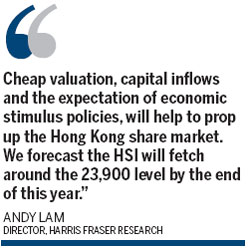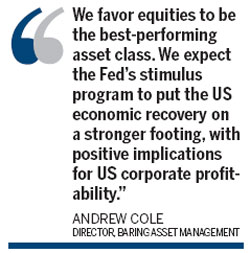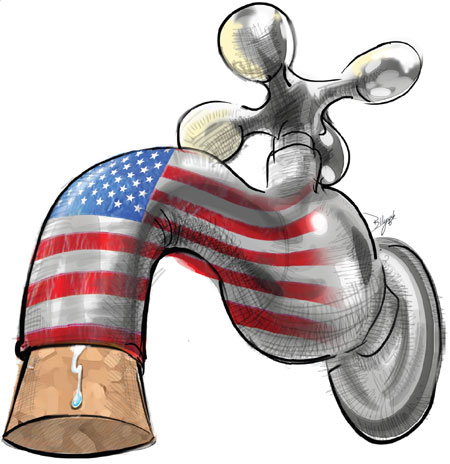Tap equities
Updated: 2013-10-25 06:53
By Oswald Chan(HK Edition)
|
|||||||||
With the US Federal Reserve's timeline for quantitative easing (QE) as yet unresolved and the Hong Kong stock market remaining volatile, financial analysts see equities as the heavyweight asset class for the future. Oswald Chan reports.
Despite the many uncertainties still clouding the Hong Kong share market, international fund managers are more bullish on equities as an asset class, because the projected QE tapering by the end of this year indicates the global economy is gradually recovering.
"We continue to favor equities to be the best-performing asset class because we expect the Fed's stimulus program to put the US economic recovery on a stronger footing. This in turn should have positive implications for US corporate profitability over the coming months," Baring Asset Management Investment Director Andrew Cole says.
"We expect risk aversion to subside and equity prices to increase significantly. We are positioned for an acceleration of the global economy, which we expect given improved data. Negative market sentiment, from a contrarian perspective, creates buying opportunities in equities," Swiss-based bank J. Safra Sarasin's Chief Investment Officer, Private Clients, Philipp Baetschi says.
The Fed launched three rounds of QE policies, in November 2008, November 2010 and September 2012, committed to buying $85 billion in Treasuries and mortgage-backed securities every month. The intention was to restore liquidity of a US economy staggered by the subprime home-loan crisis, that nearly took down the global economy.
In the process, the Fed's liability-asset balance has ballooned from $500 billion to $3.5 trillion. The Fed already held $2 trillion in government debt - amounting to 12 percent of the total US government debt.
With that kind of immense liquidity pouring into the global financial system, the negative spillover is evident everywhere. Home prices are soaring, commodities are shooting up, capital inflows mask structural imbalances in some markets and inflation is climbing.
The wind-up QE chronicle
As the US economy showed signs of gradual recovery, the Federal Reserve Board started to consider winding up QE. When the Fed hinted at tapering of QE in August, ending or reducing its purchase of government bonds, the announcement triggered drastic sell offs in the commodities markets and in emerging markets.
US bond yields shot up drastically. From the record low of 1.39 percent in July 2012, and year-to-date low of 1.63 percent in May, US 10-year treasury yields have risen sharply in the past few months, currently just below 3 percent. Rising bond yields drive up the cost of capital. That means a dampening of economic growth and lower expectations for stellar stock market performances.
Fair share
The Fed surprised the global financial market in September, when it declared it will maintain its bond-buying spree at current levels, but the announcement failed to calm the nerves of jittery financial markets.

An easing by the US Fed is still in sight. In Hong Kong, market sentiment is cautious. Based on the Hang Seng Index (HSI) closing price on Oct 24, the HSI has remained flat from its closing price at the end of 2012. The Hang Seng China Enterprises Index, sometimes called the H-Share Index (HS CEI), which guages the share price of locally-listed mainland companies has declined 9.8 percent in the same period.
"Cheap valuation, capital inflows and the expectation that the central government will introduce economic stimulus policies, will help to prop up the Hong Kong share market in the last quarter this year," says Harris Fraser Research Director Andy Lam. "We forecast the HSI will fetch around the 23,900 level by the end of this year."
According to Lam, the price-earnings (P/E) ratio of the HSI is trading at a 15 percent discount against its 10-year average. For the HS CEI, it is trading at a 30-percent discount on its 10-year average. The cheap market valuation can be expected to provide some boost to the local share market.
"The Fed tapering should be positive for Asian equity markets in the long run. The Fed's plan to reduce bond purchases is based on a strengthening US economy which means good news for Hong Kong, because the local economy will benefit from increased global demand," Vanguard's Head of Investment Strategy Group-Asia Pacific, Roger Aliaga-Diaz tells China Daily.
"If the US raises interest rates in response to its strengthening economy, this would generally associate with positive equity performance," Aliaga-Diaz adds.
Some analysts disagree. They contend the Hong Kong share market is relatively expensive, because some macroeconomic risks are still not factored into current share prices.

"Hong Kong shares are relatively expensive given the city's slowing economic growth and the moderation of the local property market," Invesco Chief Investment Officer (Asia excluding Japan).
Paul Chan says. "The city's share market may only benefit from the short-time capital inflows to the North Asian region, driven by the capital flight in the Southeast Asian countries because of the possible US tapering measures."
Chan estimates that the HSI essentially is limited to its current narrow range between 22,500 to 23,500 points.
Overvaluing H
Garth Taljard, multi-asset product manager at Schroders, agrees with Chan. Taljard is particularly worried about locally-listed H-shares arguing that they are overvalued, because macroeconomic and company risks have not been taken into account in setting their share prices.
"The H-share companies enjoy less productivity growth; and the return-on-capital of these companies is low because the bosses are less likely to pay dividends," Taljard warns.
"Moreover, the increasing non-bank credit growth in the shadow banking system on the mainland reduces transparency and increases fragility to the mainland financial system" Taljard adds.
It is clear that the US government will taper off QE because it cannot let government debt go on ballooning forever. If QE were to continue, the US dollar would exert strong downward pressure destabilizing the economy, justifying intervention by the US government to pare its stimulus policies.
The financial market now is discounting, in expectation of the Fed starting to back off on QE by the end of the year. Interest rates however, will stay low until 2015, and are not expected to "normalize" at around 4 percent to 4.5 percent until 2017.
Contact the writer at oswald@chinadailyhk.com

(HK Edition 10/25/2013 page5)